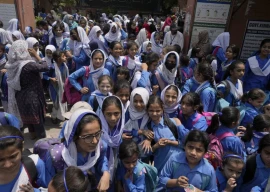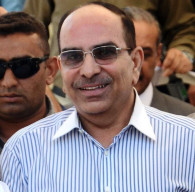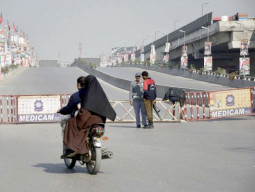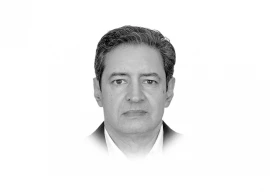
Saudi citizens carried out the Madina and Qatif attacks while the Jeddah suicide bomber was a Pakistani working as a driver for over a decade. All six nations in the Gulf region felt the shockwaves, spiking security alerts. Countries like UK and the US were quick to issue travel advisories warning citizens of a terror threat.
12 Pakistanis among 19 arrested over Saudi attacks
Over the past two years, the kingdom has witnessed 26 terror attacks. The country is engaged in a prolonged counter-insurgency operation in Yemen. Missile strikes and mortar shelling by the Iran-backed rebels in Yemen has not taken a toll on human life but has been successful in creating insecurity in bordering towns.
Unprecedentedly, the Saudi security apparatus has been coping up with multiple internal and external threats. The myth of an effective Saudi surveillance has been proven wrong. The security services are over-stretched and its wherewithal vulnerable to speedy advances in social media outlets. With economic strains calling for tough austerity measures, including the initiation of economic reforms, the internal security threat could not have raised its head at a worse time.
Add to this the extreme radicalisation of expatriate labour during their prolonged stay in the kingdom. The Jeddah attack is a symptom of a larger security problem. The doubled-edged sword of Salafism is now testing Saudi monarch way more than the Osama bin Ladens of yesteryears.
Given the country’s abundant resources, the tactical issue of insuring a similar attack is not repeated is far less challenging than addressing radicalisation.
Pakistan’s foreign ministry was quick to strongly condemn the triple terrorist acts while Army Chief General Raheel Sharif spoke to Saudi Defence Minister Prince Muhammad bin Salman over the telephone. Besides conveying his sympathies and support to Riydah, the general reiterated Islamabad’s commitment to the safety, security and territorial integrity of Saudi Arabia.
Muslim world outraged by blast near Masjid-e-Nabawi
The ominous question of Saudi reaction to a Pakistani taking extreme steps to challenge state writ haunts the nation here. Will there be a ban on Pakistani labour? Shall we see deportation of Pakistanis over suspicion of radicalism?
Saudi security agencies are currently in a state of introspection. No surprises in the offing as Riyadh will amend its internal and labour import policies and procedures. The monarchy, however, can’t deny that radicalisation of the Pakistani suicide bomber happened on its soil. Thanks to historic political and military ties, Pakistani labour and religious pilgrims won’t face any sanctions. The procedures, however, may become more stringent and time consuming.
Using existing channels of intelligence sharing and security cooperation, Saudi Arabia will bank on Pakistan’s experience of fighting terrorists and extremists. Quite possibly, Riyadh will be probing its rich citizens’ charities which fund projects and seminaries abroad. Islamabad can use the Saudi awakening to the Daesh threat to reform its largely unregulated religious seminaries. The issue of Daesh or foreign sponsored terrorism will not only be a priority issue for Pakistan and Saudi Arabia, but also for the Gulf Cooperation Council (GCC) member-states.
Jeddah suicide bomber was Pakistani: Saudi interior ministry
Undoubtedly, surveillance of social media users is as old as the innovation itself in the GCC. However, Gulf countries have not been able to effectively use surveillance to their greater advantage. Internet will become more controlled, wiretapped and even selectively blocked. GCC countries have already been combating internet-based fraud and hacking. With suspected terrorism, the free space for a common citizen or an expatriate there may be further reduced. Terrorist threat will become a useful tool in the hands of sheikhdoms to perpetuate state control over its subjects.
What is still unclear and unpredictable are the policies Saudi Arabia and other GCC nations will adopt to check homegrown radicalisation at the hands of Daesh, which is morphing into a transnational cyber-based radical cult.
Naveed Ahmad is a Pakistani investigative journalist and academic with extensive reporting experience in the Middle East and North Africa. He is based in Doha and Istanbul. He tweets @naveed360.



1736727549-0/booktok-(1)1736727549-0-165x106.webp)
1721647706-0/BeFunky-collage-(5)1721647706-0-165x106.webp)


















COMMENTS
Comments are moderated and generally will be posted if they are on-topic and not abusive.
For more information, please see our Comments FAQ